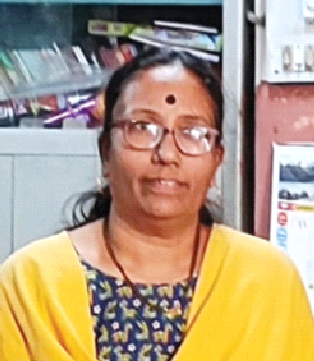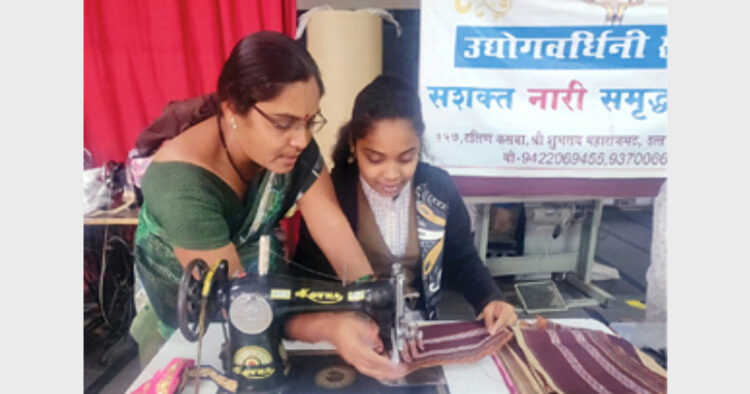There are not many clusters in India which cater too many basic human needs at the same time. Solapur is a neglected multilingual city in south Maharashtra that caters to the food and clothing sector on a large scale. The town has a unique identity as it has witnessed a steady decline in urban population for the last two decades. All other urban centres in Maharashtra registered steady growth in the urban population. But still, Solapur has been known for its food items as well as clothes and linen. One of the forces behind this success story of Solapur is Chandrika bhabhi Chauhan, who runs Udyog Vardhini, which trains women in household businesses of food supplies as well as clothing manufacturing and services in clothing.
Chandrika Chauhan, popularly known as “Bhabhi” in Solapur, started her small clothing unit in 1993 to support her family as her husband went thru a series of health problems for a few years. But as her business grown, she felt a need to train the local women who were facing problems feeding and maintaining their families as large textile mills were shutting down. She started Udyog Vardhini to train the women and develop their sewing and embroidery skills. As few women were not initiated in sewing, she started to train them in the business of food, making and selling Koradi Bhakari (completely dehydrated aseptic dry roti of Jwar) and dry chutneys and papads. She started with a batch of 16 women in 2007. As of today, she has trained 15 thousand women in food and clothing manufacturing who are running their household business successfully. These 15 thousand women have already trained another at least 15 thousand women, and the number is still increasing. The total annual turnover of the food and clothing business of 15 thousand initially trained women is estimated at whopping Rs 450 crore as of today. The additional 15 thousand women they trained second in the chain are not included when calculating this figure. The chain continues and the market is ever increasing for their products like Koradi Bhakari (Dry Roti), papad and dry chutneys. Many of them in tailoring business and sew cloth handbags for day today bazar chores and fashionable handbags. Many of them manufacture own branded cloths, like blanket sheets locally called as Godhadi. Many of them give their sewing services to the big brands in clothing.
One Ranjana Chavan, who started as a small time handbag manufacturer, now owns a handbag business with an annual turnover of 15 crore. She has shifted her base to Bhagyanagar (Hyderbad) now.
Once known for Solapuri sheets and blankets, Solapur is now known for its food supplements like Dry Rotis, Chutney, Papad, and Masalas. Many of these items are unbranded, manufactured in small households taking care of full corona protocols and cleanliness maintaining quality. The cottage industry scattered across the city sustained the corona lockdown. This semi-organised sector provided bread to these families and literally catered food to the needy of the city, including patients in hospitals to the stranded truckers on highways and from police personel to the slum-dwellers during the lockdown.

Chandrika Bhabhi of Udyog Vardhini told the Organiser that there is no manufacturing sector that remained untouched with this entrepreneurial urge of the common households. As the textile mills closed, the city’s skilled hands stood up to the challenge and tried their best in various sectors. The result was astonishing, and the city has set a good example before the country in an unorganised and semi-organised manufacturing sector. The city has a long history of water scarcity due to political and administrative inefficiency, but the people positively faced the challenge.
Solapur’s Dry Bhakari, dry Chutneys, Papad and Masalas are now being sold to many foreign countries through mouth publicity. Many families manufacture thousands of Bhakaris at their home-based unit per day. Many families manufacture thousands of tonnes of dry chutneys at their home-based unit per year.
The city’s clothing manufacturing potential has been recognised by the Central Government and Armed forces too. A few years ago, the Armed forces placed their biggest order of uniforms to Solapur with the clothing manufacturers and sewing association. It was completed with thousands of household units doing the job simultaneously. Many of central governments entities now place their orders for uniforms to Solapur.
Ditched by textile mills, the city rose again through these household manufacturing businesses. Today, the total turnover of this semi-organised food and clothing sector is estimated at around two and half thousand crores annually. The amount may be bigger but not less, said a local journalist.
As the city caters to society’s food and clothing needs, it has also been recognised as a furniture manufacturing cluster, with a large number of furniture manufacturing units coming up in the last few years.
The city of Solapur has the blessings of saint Siddheshwar Swami, and it has proved it again and again with the great achievements of common people. But it has been politically and administratively kept neglected years after years even though it’s the home to ex-CM and ex-Central Home Minister Sushilkumar Shinde. The negligence never bothered the common people who keep achieving great heights in the manufacturing sector of foods and clothing.














Comments